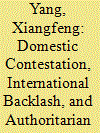|
|
|
Sort Order |
|
|
|
Items / Page
|
|
|
|
|
|
|
| Srl | Item |
| 1 |
ID:
181915


|
|
|
|
|
| Summary/Abstract |
This article aims to provide a first-cut analysis of the causes of the initial COVID-19 outbreak as well as the subsequent political contestations in which the masses ended up rallying behind the party-state. While the Wuhan fiasco had everything to do with entrenched pathologies of the bureaucratic state, after Beijing took central command of the broader campaign its overriding priority was to contain the virus with a goal toward salvaging its legitimacy at home. To that end, Beijing unleashed its warrior diplomats to aggressively defend its handling of the pandemic, even to the detriment of its international image. Nevertheless, the strategy worked because the nationalist and populist backlash against the regime’s foreign and domestic critics helped turn the public opinion around in its favor.
|
|
|
|
|
|
|
|
|
|
|
|
|
|
|
|
| 2 |
ID:
181264


|
|
|
|
|
| Summary/Abstract |
This paper analyses the relationship between the COVID-19 crisis and multinationalism in Spain from two complementary angles. First, it provides an overview on how the multinational and decentralized character of Spanish territorial politics shapes the response to the crisis. We find that the management of the crisis reflects and exacerbates the main features of the Spanish territorial model as a case of incomplete federalism with severe intergovernmental deficits. Second, we analyze the effects of the pandemic on Catalan self-determination demands through a brief description of parties, public opinion and governmental reactions. We argue that Catalan secessionism faces several new impediments as a result of the pandemic, but we also find that the COVID-19 crisis provides a window of opportunity for this movement regarding grievance-building and regional governmental performance and salience. We conclude with a general reflection on the ambivalent impact of COVID-19 crisis on Spanish regionalism and territorial politics. Overall, the COVID-19 crisis does not seem to mean an improvement but a potential setback for the accommodation of national diversity.
|
|
|
|
|
|
|
|
|
|
|
|
|
|
|
|
| 3 |
ID:
176173


|
|
|
|
|
| Summary/Abstract |
From collective flash-mobs such as "clap for our carers," to solidarity campaigns launched by a variety of activist organizations, to the Black Lives Matter movement and anti-lockdown protests by right-wing groups, the COVID-19 crisis has been marked by intense social protest. In this article, I analyze these protests as different responses to the exceptional conjuncture of the pandemic, through the lens of social movement theory and the analysis of grievances and action repertoires. Focusing on the United States and Europe, I highlight that protests during the pandemic reveal the nature of the COVID-19 emergency as a moment of political suspension and heightened social confrontation. Different movements respond to the COVID-19 health crisis either by navigating the straits between voicing dissent and abiding by health rules while demanding a return to pre–COVID-19 normality, or by seeing the disruption of the pandemic as an opportunity to seek redress for deep-seated problems. Regardless of their differences, pandemic protests point to the return of a crowd element and impromptu and spontaneous forms of action through tactics such as sit-ins, banging pot protests, the occupation of building, the toppling of statues symbolizing the enemy, or the foiling of anti-contagion rules. This return to pre-modern protest logics highlights the depth of the crisis of authority revealed by COVID-19, during which inequalities have further intensified.
|
|
|
|
|
|
|
|
|
|
|
|
|
|
|
|
| 4 |
ID:
180064


|
|
|
|
|
| Summary/Abstract |
In the midst of the Covid-19 crisis, the EU discourse on migration has acquired a humanitarian dimension that deserves investigation. The European Commission in particular has provided a discursive conceptualisation of the European human and humane approach to migration, promoting a change in the EU migration frame. Qualitative discourse analysis suggests that the European Commission’s programmatic discourse is not just a coordinative discourse among policy actors, it rather aims to shape the preferences of EU policy-makers emphasising strategic ideas and principles enshrined in EU Treaties. The Covid-19 crisis could thus be a window of opportunity for the European Union to embark on a new migration governance framed within a humane approach.
|
|
|
|
|
|
|
|
|
|
|
|
|
|
|
|
| 5 |
ID:
181267


|
|
|
|
|
| Summary/Abstract |
The federal political system we call the United States is both a multinational and a multiethnic state. Puerto Rico has been a peripheral part of the United States since 1898, and its inclusion in the outward edges of the U.S. state apparatus turns the U.S. into a multinational democracy, exhibiting a form of peripheral multinationalism. In recent years, the rise of Trumpism and the transformation of the Republican Party have energized those who envision an ethnonationalist view of U.S. national identity: a political momentum is strengthening, sustaining a nativist, white majority nation reaction that would revive ancestral racial and ethnic concepts of U.S. national identity. This of course is not a favorable development for the accommodation and the fair treatment of Puerto Rico within the U.S. federation and has multiple ramifications, including the foot dragging behind the Republican federal government’s response to the COVID-19 crisis of 2020–21, and the other major natural disasters that have impacted the island, especially the devastation caused by Hurricane María.
|
|
|
|
|
|
|
|
|
|
|
|
|
|
|
|
|
|
|
|
|